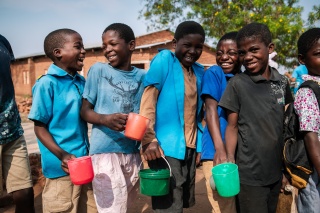
Interview with Angela Chipeta-Khonje, Malawi Country Director
Hear the latest on the important work Mary's Meals is doing in Malawi
We recently welcomed Angela Chipeta-Khonje, Country Director of Mary’s Meals Malawi, to our offices in Glasgow. Watch or read on to hear from her on the importance of Mary's Meals in Malawi.
Can you tell us about your role?
My role is to make sure the one million children we are feeding in Malawi are receiving their meals every school day. This involves the logistics aspect – monitoring and making sure the volunteers are pitching up to cook the food. But also engaging with government and connecting with communities, because this is a community programme and we want the communities to own it, so we are working hand in hand with them as well. All these pieces are connected so the child, who is at the centre, is fed every school day. It’s a big job, but it is fulfilling knowing the children are going to school. In Malawi, at the moment, we are experiencing severe hunger. Over 6 million people are in need of food assistance. And in such situations, children are the most affected. Doing this job, we are responding to this need so it is very fulfilling, I must say.
Malawi is facing extreme drought just now. Can you tell us how it is impacting children in the country?
There have been quite a number of climatic shocks that we’ve been experiencing over the years. Last year we had Cyclone Freddy, where more than two million farmers lost their crops. And this year we hardly experienced any rains. So that has made a lot of farmers have no crops, a lot of families have no food. And, in turn, a lot of children don’t have food. Most of the children now, we are seeing them going to school because they know that they’re going to get a meal. But we are not reaching all the children. We are only reaching about 1.1 million, but we have over 2.5 million children that are still in need. So, as much as we are reaching so many children – there are still so many more that need food.
What other challenges are communities in Malawi facing?
In Malawi, poverty levels are just so high; 90 per cent of people live under $2.00 a day. It’s heartbreaking. Currency is not stable and that pushes up prices, especially for food. Food inflation is at 36 per cent, which is one of the highest in the region. There are so many things that Malawians are going through at the moment. Mary’s Meals is a really critical social safety net for the communities.

What impact do you see Mary’s Meals having on children, their families and their communities?
The biggest change is the joy, to be honest. You look at these children – the smiles, the energy. The enrolments increase, you see increase in attendance and progression from one class to the next. For me, I see that as hope because it will really take these communities out of poverty. [The children] will have an education, they'll be able to take care of themselves. It is something that I feel is the huge impact that we're going to see over the years.
I can share an example of one child I met, who has gone through Mary’s Meals and is now a lecturer at university. He is very keen to tell the world: “If it wasn’t for Mary’s Meals, I wouldn’t be here, because it was what was driving me to go to school. My parents were pushing me to go to school because they knew that I’ll be able to have something to eat.”
Is Mary’s Meals changing attitudes towards education in Malawi?
Yes, it is changing attitudes of people towards education – mostly as a country where poverty levels are so high. And government is keen to make sure that more children go to school. What government has done is they've made primary schools free, and that has really, really, really helped.
We're seeing more children going to school. They're coming in to eat and that to me is something that is also helping to get more people educated. And that will be great in the years to come.
What is your hope for the future for children in Malawi, and what role does Mary’s Meals play in that?
For me, the hope is Mary’s Meals is an investment. We are responding to the immediate hunger but, in the long term, it's an investment towards human capital development – and that's what Malawi needs.
We need an educated population so that all these issues – poverty, climate change, food security – would be responded to by the population that has gone to school.
What is your message for Mary’s Meals supporters in the UK?
I would ask our supporters, please continue to support us. The need in Malawi is so huge, so many children are in need of food. At this moment, various new programmes are offering hope to so many children, and this is their only way out of poverty. So please continue to support us. There's so much need out there.
